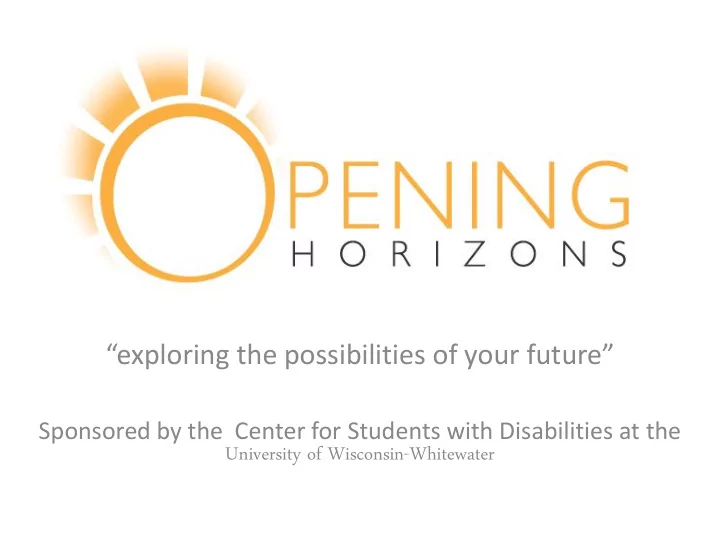

“exploring the possibilities of your future” Sponsored by the Center for Students with Disabilities at the University of Wisconsin-Whitewater
Documentation Guidelines • In college/university ADA and Section 504 are our guidelines not IDEA • IEP, SOP or 504 Plan is helpful but not sufficient • You are responsible to provide your documentation to the disability office
All documentation must… • Completed by the appropriate licensed professional • Be appropriate to verify eligibility • Demonstrate a current substantial impact of one or more major life activities • Support the request for accommodations, academic adjustments and or auxiliary aids
Deaf and Hard of Hearing • An audiological evaluation and/or audiogram, no older than 3 years if loss is progressive. • An assessment of the functional limitations of the hearing loss for which accommodations is being requested, and whether the degree of limitation is mild, moderate or substantial. • Suggestions as to how the functionally limiting manifestations of the hearing loss condition(s) may appropriately be accommodated
Blindness and Low Vision • An ocular assessment or evaluation from an ophthalmologist. • A low-vision evaluation of residual visual function, when appropriate. • An assessment of the functional limitations of the condition(s) for which accommodations is being requested, and whether the degree of limitation is mild, moderate or substantial. • Suggestions as to how the functionally limiting manifestations of the visual condition(s) may be appropriately accommodated
Mobility or Health Related Disability (OHI) • An identification of the disabling condition(s). • An assessment of the functional limitations of the condition(s) for which accommodations is being requested, and whether the degree of limitation is mild, moderate or substantial. • Suggestions as to how the functionally limiting manifestations of the condition(s) may be appropriately accommodated
Psychiatric Disability (EBD) • An adult diagnosis (DSM-IV-R) – Indicating the nature, frequency of symptoms • Evidence of an impairment and functional limitations • Current impact (last 6 months) on the academic setting • Prescribed medications, dosages, and schedule • Detailed clinical summary
Traumatic Brain Injury (OHI) • Thorough neuropsychological. Data should include subtest scores and percentiles. • Evidence of current impairment. A history of individual's presenting symptoms and evidence of behaviors that significantly impair functioning. • A diagnostic interview. • A specific psychological diagnosis as per the Diagnostic and Statistical Manual - IV (DSM-IV). • A detailed clinical summary.
ADHD/ADD Evidence of early impairment. The condition must have been exhibited in • childhood in more than one setting. Evidence of current impairment. Behaviors that significantly impair functioning • in two or more settings must be provided. In an academic setting, functional impairment is most often expressed in poor academic performance across a variety of academic tasks. In adults, work history may demonstrate an inability to retain or maintain employment. A diagnostic interview. • Neuropsychological or psycho educational assessment. Such data should • include subtest and standard scores. A specific psychological diagnosis. An indication of whether or not the student • was evaluated while on medication and the degree to which the prescribed treatment reduces the level or degree of impairment.
Learning Disability Three types of information are necessary when identifying a learning disability at the post-secondary level and must be clearly presented in the psycho educational assessment report: Recent psychometric data (within the last 3 years for a high school • student, and the last 5 years for an adult) that support the presence of impairment in one or more of the following areas: listening, speaking, reading, writing, reasoning, or mathematical abilities Evidence of a history of learning difficulties documented through • collateral information, e.g. developmental and educational histories, background information from previous psycho educational assessments A current functional limitation (i.e., the difficulty must significantly • interfere with a students current academic performance)
Learning Disability • Qualified Professional • Clear diagnostic statement – Including objective testing evidence – Attitude, cognitive, and achievement • Justification how the accommodation minimizes the impact of the LD on academics
Autism Spectrum Disorder • A specific diagnosis by a qualified professional from the DSM-IV • Current cognitive and aptitude testing • Current emotional, social, behavioral, communication, sensory functioning, and sensitivity to environmental conditions. • A clinical history of behaviors • Current medications, schedule and how the medications help • Recommendations of accommodations
Each college or university will have documentation guidelines, go to the website of that school to find out the requirements!!
Recommend
More recommend